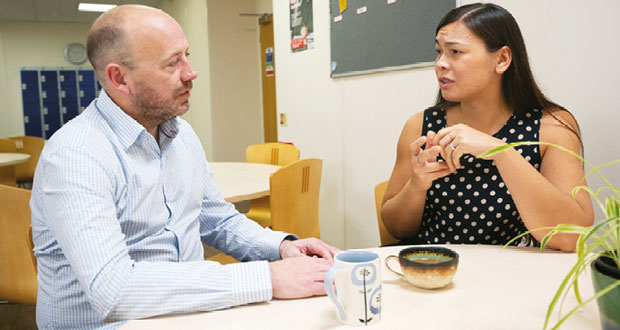 The way we work has changed in an unprecedented way, making support for mental health in the workplace more important than ever, says Louise Fernand, Product Manager for Mental Health and Wellbeing at the British Red Cross
The way we work has changed in an unprecedented way, making support for mental health in the workplace more important than ever, says Louise Fernand, Product Manager for Mental Health and Wellbeing at the British Red Cross
Companies routinely consider first aid to protect the physical wellbeing of their staff, but mental health is rarely given the same thought. Did you know that:
- One in 6.8 people will experience mental health problems in the workplace.
- 17.1 million working days were lost due to work-related stress, depression or anxiety in 2022/23.
- There were an estimated 875,000 cases of work-related stress, depression or anxiety in 2022/23.
WHAT CAN BUSINESSES DO TO SUPPORT THE MENTAL HEALTH OF THEIR STAFF?
Creating a mentally healthy and productive workplace requires a holistic approach, with mental health training that helps individuals practice self-care, manage stress, and maintain wellbeing. Mental health training, such as British Red Cross Mental Health at Work courses, can also empower individuals with the knowledge and skills to nurture their wellbeing, enhance resilience, and cultivate healthier relationships, leading to a happier team. Offering this type of training reduces burnout, boosts productivity, and improves overall mental health.
HOW CAN MENTAL HEALTH AT WORK TRAINING BENEFIT YOUR ORGANISATION?
By taking a positive approach to mental health and wellbeing in the workplace, your organisation can benefit from:
- More engaged and motivated staff.
- Reduction in absence and associated costs.
- Increased productivity and staff retention.
- Improved professional reputation.
- Satisfied customers.
HOW CAN MENTAL HEALTH AT WORK TRAINING BENEFIT YOUR TEAM?
Your staff will benefit from:
- Developing awareness of how to support themselves and others when faced with difficult situations using a practical framework.
- Managing stress and developing awareness of stress.
- Optimising wellbeing at work and in personal life.
- Developing greater confidence when dealing with difficult situations.
TRAINING WITH THE RED CROSS
The Red Cross has a global reputation and experience in providing both emotional and practical support to individuals in crises. The Red Cross’ psychosocial responses include major floods, house fires and transport incidents.
A key benefit of learning with the Red Cross is the expertise of its teams in supporting people in emotionally challenging situations.
The course content is based on the globally recognised CALMER psychosocial framework . The framework has been developed by the Red Cross’ psychosocial team and aims to support individuals during and after an emotionally challenging situation.
WHY IS THIS TYPE OF APPROACH IMPORTANT?
- It can help to minimise further distress.
- It ensures a calm and thoughtful approach when dealing with a situation.
- It encourages clear communication with an emphasis on listening to the needs of the individual.
- It helps responders increase awareness of and manage their own emotional needs, managing stress, crises and preventing burnout.
WHAT MENTAL HEALTH AT WORK TRAINING COURSES ARE AVAILABLE?
The Red Cross offers six short, interactive mental health courses which are designed to build both team and individual resilience and to help staff members return to and maintain a state of positive mental wellbeing. The law requires employers to tackle work-related stress. The HSE references the six ‘Core Standards’ for managing mental health at work. Our courses are directly relevant to and reflect these recommended standards. Effective mental health training for staff should always suit the needs of the organisation. This is why the Red Cross has developed a suite of highly effective courses for different people and situations. These are:
- Wellbeing Support at Work: employees learn to support themselves and others during and after a difficult event.
- Stress Awareness at Work: to develop strategies for managing stress and building resilience.
- Building Team Resilience at Work: for teams who want to manage stress and build resilience.
- Stress Management at Work: helps managers to reduce the impact of stress on both individuals and teams.
- Mental Health Awareness for Managers: gain an understanding of mental health problems and skills in fostering a supportive work environment, improving wellbeing, and optimising team performance and productivity.
- Dealing with Distressed Callers: specialist training for call handlers who regularly deal with individuals experiencing emotional distress, enabling them to provide reassurance while reducing the stress they experience at work.
With various mental health at work training courses available, it is important to enrol you and your team on a course that fulfils your requirements.
Look for courses have been designed holistically to equip your staff and managers with the skills needed to nurture wellbeing, improve resilience, and stop stress escalating into more severe mental health issues.





